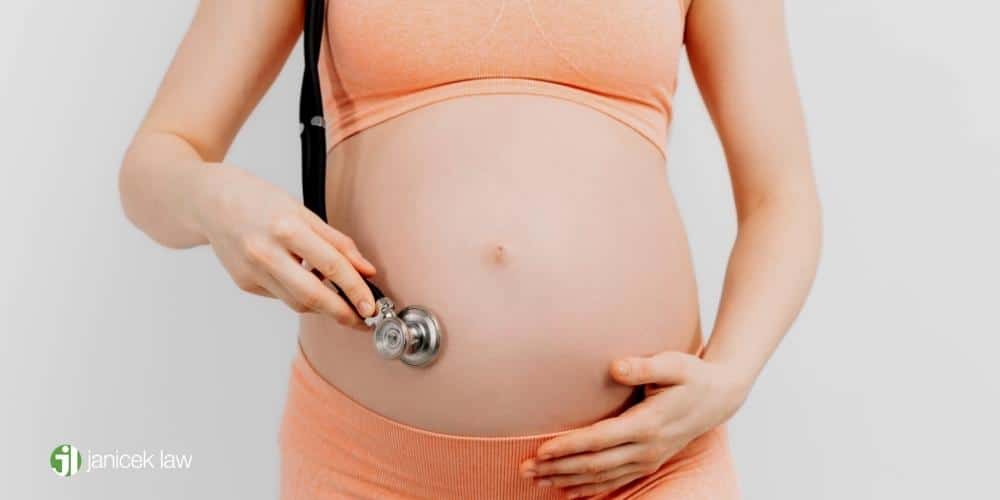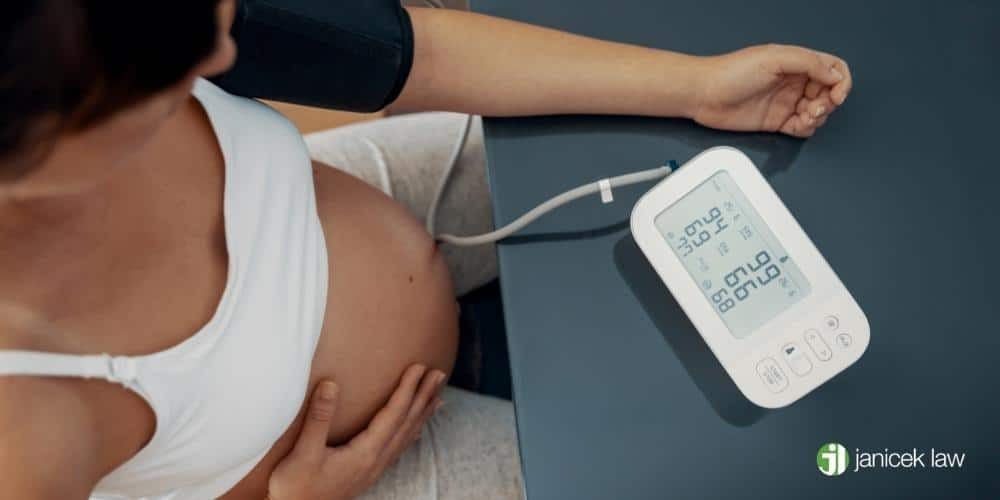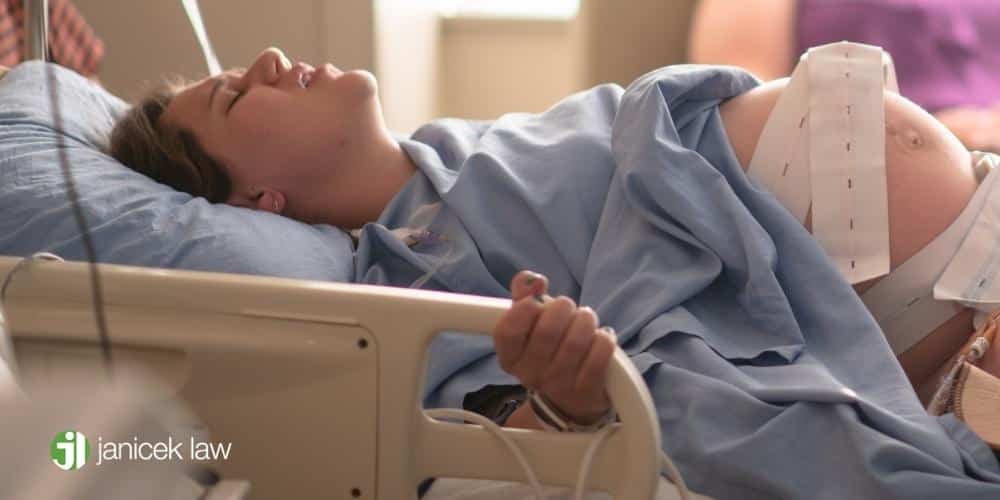San Antonio Preeclampsia Lawyer
Preeclampsia is a life-threatening medical condition characterized by high blood pressure and excess protein in the urine. It typically affects women after 20 weeks of pregnancy. In order to properly manage preeclampsia, doctors have to act fast. If they don’t, the situation can easily get out of control and threaten the mother or the baby’s life. Unfortunately, thousands of women experience preeclampsia during pregnancy every year, and due to their doctor’s negligence, they suffer life-threatening birth injuries.
The San Antonio birth injury lawyers at Janicek Law are fully equipped to litigate all sorts of medical malpractice cases and birth injury cases. If you or someone you love suffered from life-threatening complications from preeclampsia during pregnancy, you may have grounds to file a claim. Call 210-366-4949 today to schedule a free consultation with our experienced malpractice lawyers in San Antonio.
What is Preeclampsia?
Preeclampsia occurs when pregnant women have high blood pressure (hypertension) and high levels of protein in the urine (proteinuria). This type of gestational hypertension generally occurs in the second and third trimesters and is considered a medical emergency for both the mother and the baby. Without timely medical treatment, the mother and baby could suffer from a host of serious complications.
Preeclampsia is characterized by blood pressure that’s higher than 140/90mmHg. The other most common symptom of preeclampsia, high levels of protein in the urine, indicates that the kidneys aren’t functioning properly. Both mild preeclampsia and severe preeclampsia is a serious medical condition because it puts lots of physiological stress on all the organs in the body. If the mother’s organs are malfunctioning and enduring chronic stress, then it’s only a matter of time before the baby is affected too. For example, this serious blood pressure condition can drastically affect placental blood supply. That’s why it’s crucial for medical professionals to act fast upon preeclampsia diagnosis.
What is HELLP Syndrome?
HELLP syndrome is another life-threatening condition that pregnant women can suffer from. HELLP stands for hemolysis, elevated liver enzymes, and low platelet count. While HELLP syndrome shares some of the same symptoms with preeclampsia, the two conditions are different. Preeclampsia patients always have chronic hypertension and high levels of protein in the urine, and HELLP syndrome patients may not have either of these symptoms.
How Many Pregnant Women Suffer From Preeclampsia Every Year?
According to a 2019 study, 5% to 7% of pregnant women suffer from pregnancy-induced hypertension. Tragically, this serious medical condition takes the lives of 70,000 mothers and 500,000 unborn babies in the world every year. In the U.S. specifically, 400,000 pregnant women suffer from preeclampsia every year. Additionally, in the U.S., preeclampsia causes the most maternal deaths, c-sections, premature deliveries, and maternal ICU admissions.
Preeclampsia during pregnancy is typically resolved during birth. Very rarely, though, women can experience postpartum preeclampsia as well. Postpartum preeclampsia can occur between 48 hours and 6 weeks after birth.
Preeclampsia Symptoms
Symptoms of preeclampsia include:
- Severe headaches
- Blurred vision
- Abdominal pain
- Edema (sudden swelling in the hands and face)
- Difficulty breathing
- Sudden changes in weight
- Nausea or vomiting
In very serious cases of preeclampsia, women may experience a blood pressure reading of 160/110 mmHg or higher, fluid buildup in the lungs, seizures, fetal distress, little to no urine production, low levels of blood platelets, and poor liver or kidney function.
Doctors will usually diagnose preeclampsia based on symptoms, blood tests, urine tests, and blood pressure checks. Then, they may monitor the baby’s heart rate through a fetal non-stress test.

What Causes Preeclampsia During Pregnancy?
No one knows for sure what causes preeclampsia during pregnancy. Some medical professionals believe that the high blood pressure condition stems from placental health issues. The placenta is the organ that houses the baby during the whole pregnancy, providing it with all the nutrients and oxygen it needs to grow. The theory is that the blood vessels in the placenta fail to develop or function properly, therefore causing blood circulation problems in the mother’s body. Of course, other risk factors can lead to mild to severe preeclampsia as well.
Preeclampsia Risk Factors
Risk factors for preeclampsia include:
- Being pregnant with twins or triplets
- Receiving a preeclampsia diagnosis in a previous pregnancy
- Having a family history of preeclampsia
- Being pregnant over the age of 40
- Being obese
- Having a medical history of high blood pressure, kidney disease, diabetes, or autoimmune disorders
- Using in vitro fertilization to get pregnant
Preeclampsia Treatments
The main way to treat preeclampsia, especially in the final weeks of pregnancy, is to induce delivery. It’s possible to have a vaginal delivery with preeclampsia, but many women (and their doctors) opt for a C-section. However, if a woman develops preeclampsia far before 37 weeks of gestation, the doctor will have to determine whether the baby will survive a premature birth. If preterm birth is the only option, the baby will likely spend the first several weeks of its life in the NICU.
If the pregnant woman is experiencing mild preeclampsia before the 37 week mark, doctors may try other treatments to keep the baby healthy and inside the womb for as long as possible. That way, all the baby’s organs will be as developed as possible before premature birth. For example, doctors may administer IV blood pressure medications and anticonvulsants to manage a pregnant woman’s high blood pressure and prevent seizures, which is a symptom of severe preeclampsia. Additionally, doctors may inject steroids in order to help the baby’s lungs develop quicker, just in case preterm birth occurs.
The Preeclampsia Foundation states that symptoms of preeclampsia resolve within 48 hours of delivery. As stated previously, postpartum preeclampsia is incredibly rare. However, doctors are supposed to monitor a preeclampsia patient closely, even after delivery.
Contact our San Antonio maternal birth injury lawyer group to learn more.

How to Prevent Preeclampsia
Because no one knows for sure what causes preeclampsia, there’s not much you can do to prevent it except to keep your body as healthy as possible during pregnancy. Make sure you get regular blood pressure checks, monitor your blood sugar, take prenatal vitamins, move your body when you can, sleep as well as you can at night and eat as healthy as you can.
Additionally, make sure you schedule and attend routine prenatal appointments to check on yours and the baby’s health. If your doctor notices that you have elevated or high blood pressure at any point in your pregnancy, they should give you medications or lifestyle tips to lower your blood pressure.
The American College of Obstetricians and Gynecologists (ACOG) claims that taking low-dose aspirin every day after 12 weeks of pregnancy can potentially prevent a woman from developing preeclampsia. If you’re concerned about your risk of preeclampsia, discuss the possibility of implementing low-dose aspirin into your supplement regimen.
Complications of Preeclampsia During Pregnancy and Birth
Preeclampsia is a very serious medical condition. If left untreated, it can lead to a variety of pregnancy complications including:
- Blood clots and other bleeding problems
- Placental abruption (placenta separates from the wall of the uterus_
- Liver damage
- Pulmonary edema
- Kidney failure
- Seizures
- Premature birth and low birth weight
- Fetal or maternal death
Undiagnosed Preeclampsia Medical Malpractice Claims in San Antonio
Medical malpractice can certainly lead to a potentially serious pregnancy complication, especially if the patient has preeclampsia. Any kind of gestational hypertension requires quick medical intervention. If you or your baby suffered major birth injuries due to your doctor’s failure to respond appropriately to preeclampsia, you could have grounds to file a birth injury case.
The San Antonio medical misdiagnosis lawyers at Janicek Law have decades of combined experience in litigating all sorts of birth injury cases. Our birth injury lawyers will listen to your story and help you determine the best course of action to receive justice.
Compensation for Undiagnosed Preeclampsia in San Antonio
Victims of birth injuries can receive compensation for the following damages:
- Past and future medical bills
- Past and future rehabilitative bills
- Physical pain and suffering
- Emotional distress
- Counseling costs for mental health treatment
- Lost wages
- Loss of consortium
- Funeral and burial costs if the medical malpractice incident led to maternal or fetal death

Undiagnosed Preeclampsia Lawsuit Attorney in San Antonio, Texas
At Janicek Law, we have a huge team of San Antonio personal injury lawyers and birth injury lawyers. We know that no amount of money can get rid of the physical and mental trauma associated with birth injury cases, but it can help you pay off some of the debt associated with a traumatic birth. Allow our San Antonio legal team to fight for your justice during this impossible time. To schedule a free consultation, call 210-366-4949 today.
